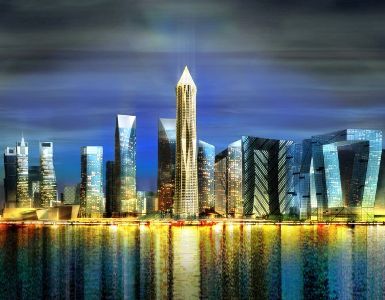
A Report on Intelligent Urbanization, prepared in 2010 for the Confederation of Indian Industry by Booz & Co and Cisco, offers some bold and comprehensive ideas, notes Subir Roy
The country is to have a 100 smart cities that will be both greenfield and brownfield.
While details of the scheme are not yet known, Shankar Aggarwal, the secretary to the Union government for urban development, has provided a preview.
Issues related to land, and to red tape, rules and regulations are being addressed so that the private sector can be brought in; it will provide 90 per cent of the investment.
The government is looking at building by-laws and floor area ratio so that you can build up instead of out, thus requiring less land.
A smart city will have smart infrastructure -- roads, water and sewer networks, solid-waste management systems, drainage network, street lighting, pedestrian walkways, signal system, public toilets, gas supply, and safety and security systems.
This looks like a laundry list of what any well-run city with a decent quality of life should have.
To be 'smart' beyond this presumably means extensively using information technology for better management and delivery.
But what is disturbing is the continued faith in raising the FAR as a substitute to bringing more urban land into play, despite contrary empirical evidence.
A study by Bimal Patel and V K Pathak, after looking at Ahmedabad and Mumbai, concludes that “if FSI [floor space index] norms are relaxed without a substantial increase in the supply of land to be developed, the price of land can increase, favouring land owners and developers who hold large land banks, without resulting in a desired decrease in property prices in favour of the consumers”.
The way to arrive at smart cities is to reform urban local bodies .
A Report on Intelligent Urbanization, prepared in 2010 for the Confederation of Indian Industry by Booz & Co and Cisco, offers some bold and comprehensive ideas.
It says the ULBs are weak and ineffective, lacking finances and capabilities, and suffering from inadequate devolution of functions and powers.
The way to begin is to create a 'fourth' list in the Constitution called the 'local list' after the central, state and concurrent lists.
This list will reserve subjects in the 11th and 12th Schedules of the Constitution for local bodies.
This will formalise the third or 'local' tier of government.
Such enabling is necessary to strengthen the basics -- revamping governance and financing.
This in turn will allow capabilities to be built up.
To address the issue of transfer of executive powers, what is enumerated in the 73rd and 74th amendments to the Constitution should be made mandatory. It will include transfer of fiscal authority.
The Finance Commission should specify the allocation of resources among the Centre, states and local bodies.
A share of the goods and services tax, or the GST, collected in a jurisdiction can be allocated to the respective urban local body.
To be able to exercise these powers and function with the resources made available, the ULBs should give top priority to improving their capabilities.
There should be a state-level municipal cadre so that talent can be attracted, careers foreseen and skill traditions built up.
A sea change has to come in training and a whole apparatus of information technology deployed under the leadership of a chief information officer.
On the financial front, the ULBs should invariably shift to accrual accounting and proper budgeting, put in place internal controls and assessment systems, and maintain asset registers.
They should also publish balance sheets, and income and expenditure accounts.
The bottom line is you cannot do a thing to create a better urban India without the active involvement of the states in empowering and energising the ULBs.
While Hyderabad and Ahmedabad have taken some steps forward, see what has happened to Bengaluru.
There is wide consensus that the best way to energise a local body with credible political leadership is for it to have a directly elected mayor.
Realising this, the Bharatiya Janata Party, in its manifesto for the 2008 Karnataka Assembly elections, promised a directly elected mayor for Bangalore. Then a year after coming to power, it quietly buried the idea because of internal opposition.
State politicians across parties like to have the ULBs feeding out of their hands, keeping them weak and inefficient. Cities will remain unsmart unless the Modi government is able to change this.
Two states, Odisha and West Bengal, have offered the Centre lists of cities that they want developed as smart cities.
This means they may be willing to carry out the necessary reforms.
But the states’ moves can also be a ploy to get central funding while changing as little as possible.
A look at how the United Progressive Alliance government’s flagship urban-renewal programme fared gives us some idea.
States and the ULBs primarily tried to tick off items in a list of reforms they needed to carry out, so as to continue to receive funding with little change on the ground.
Truly smart cities are a long way off.
Photograph: Courtesy, Gujarat International finance Tec-city










